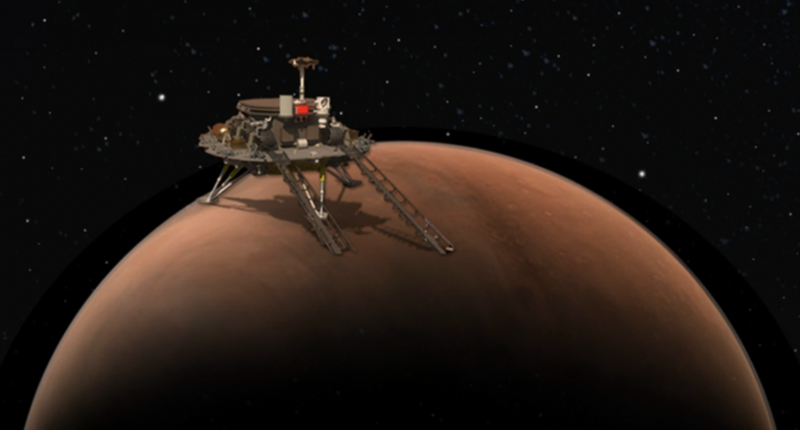Humanity’s conquest of space just recorded a significant victory, and got etched forever into history. China’s latest Martian mission “Nihao Mars”, yielded success as the Tianwen-1 probe China sent to Mars in July 2020 did not suffer any hiccups, and it successfully reached the Red Planet on Saturday (after entering Mars’ orbit in February). Historic however, was the landing of the rover ‘Zhurong’ on Mars, making China only the second nation after the US, to land a rover on the red plane..
According to reports by state media, confirmed by China’s premier space agency China National Space Administration (CNSA), the lander navigated the “seven minutes of terror” using a combination of a protective capsule, a parachute, and a rocket platform while continuing its descent over the Martian atmosphere (something that was described as “the most challenging part of the mission”), its destination being Utopia Planitia, a vast lava plain in the north, and landed successfully. This also marks the first instance and orbiting, landing, and roving operation during its maiden mission to Mars, surpassing both Russia and the US. The US had already sent the rover Perseverance to Mars, and recently NASA added another feather to its cap after recording the first flight of its helicopter Ingenuity in Mars.
“The distance was too far away that the spacecraft has to do it totally by itself,” said Chen Lan, an independent analyst specializing in China’s space program. “If there was something wrong, people on the Earth have no way to help.”
The six-wheeled, solar-powered Zhurong, which refers to a Chinese god of fire and war, would be staying for three months on the Red Planet, will be collecting and analyzing rock samples, taking pictures, and collecting other geographical data. It weighs about 240 kg and carries six scientific instruments.
Chinese President Xi Jinping, on behalf of the ruling Communist Party of China (CPC) Central Committee, the State Council, and the Central Military Commission (CMC), congratulated the team’s “outstanding achievement” in a special message. “You were brave enough for the challenge, pursued excellence, and placed our country in the advanced ranks of planetary exploration,” he said.
“China has left a footprint on Mars for the first time, an important step for our country’s space exploration,” China’s state-run Xinhua News Agency said.
It was only last month that China put a core module into orbit as part of its effort to build a space station to rival the International Space Station (ISS), which involves the collaborations of USA’s NASA, Russia’s Roscosmos, Japan’s JAXA, Europe’s ESA, and Canada’s CSA.
It is fast catching up with the US and Russia, who have spearheaded man’s venture into the final frontier so far. And Mars is not only a potential target for landing missions and colonies, it can also help unlock secrets like the origin and evolution of the solar system and life itself.
The Tech Portal is published by Blue Box Media Private Limited. Our investors have no influence over our reporting. Read our full Ownership and Funding Disclosure →






